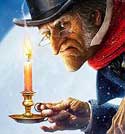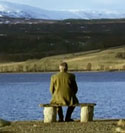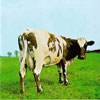
Stave One: The ghost of global warming
Global warming was dead, to begin with. There is no doubt whatever about that. The register of his burial was signed by Lindzen the clergyman, Spencer the clerk, Morano the undertaker, and lauded from the rooftops by Christopher, Viscount Monckton of Brenchley, who sat in his library before the roaring log fire enjoying a fortifying glass of 40-year-old 60% proof Glenfarclas.
Global warming was as dead as a doornail.
About Tannochbrae Manor the snow lay deep and crisp and even. The weeks preceding Christmas had brought blizzard after blizzard to the glens of Scotland, and the Laird had only just managed to regain the old house after his Mexican trip. The roads were now impassable, with drifts ten feet deep blocking the drive and snow half way up the front door. Old Scrotum, the wrinkled retainer, was attempting to keep a path open to the woodshed, but now that the ghillie McShane had taken to his bed complaining of frostbite, he was fighting a losing battle. Monckton sipped his whisky (no ice, no water — they were for heathens), and pondered plans for a network of tunnels to be dug around the Manor if there was no respite from this vicious winter.
A gust of chill air blew in as the library door flew open, followed closely by a snow-encrusted Scrotum, his shaggy eyebrows frosted with a delicate white lacework of deliquescing crystals and a small icicle dangling off the end of his nose. He unloaded his cargo of pine logs alongside the fire and made to leave. Open fires were nice, but the library was still distinctly chilly. The kitchen was a different matter, snug and warm with the Aga almost glowing as it filled the old stone room with heat. The Laird insisted that it be fired only with the finest Welsh steam coal, hand hewn by private enterprise miners. It was another of Monckton’s affectations, to be sure, born of the time he’d spent in Cardiff in the ‘70s, but Scrotum was forced to admit the glossy black coals made a damn fine fire.
Scrotum looked at Monckton, and wondered if the time was right. “Would you care for another wee dram, sir, before I attend to the kitchen fire?”. Monckton nodded and proffered his glass. Scrotum took it to the drinks cabinet, poured a generous shot of the marmalade-coloured fluid and then, glancing quickly over his shoulder to make sure he wasn’t watched, drew a small green bottle out of his coat pocket and added a couple of drops to the glass.
Monckton stared into the fire. Resin dripped and flared from the gnarly old pine logs. He let his mind wander over the events of the last few years, his transformation from journalist and puzzle designer to world-famous scientist and expert on global warming. It hadn’t all been plain sailing — there seemed to be a distressing number of birds of prey taking an interest in his doings, and he was never going to return to Australia after what that vicious koala had done to him, but he took pleasure in having overcome those minor difficulties, and like St George, risen again to plunge the blade of his rapier wit deep in the vitals of the global warming dragon. His eyelids felt heavy. Florrie’s steamed plum pudding, which he had enjoyed perhaps a trifle too enthusiastically, was sitting heavily on his stomach. His head drooped.
“Christopher.” The voice was soft but insistent. “Christopher. Open your eyes. I have much to show you.” Monckton opened one eye slowly. It took a great effort. Then he started awake, shocked by what he saw. In the flames of the fire was a face. It was familiar, but he couldn’t put a name to it. It seemed to glow with an inner light, eyes a baleful yellow. The receding hair was a wreath of smoke twisting in the updraught.
“Who are you? What do you want?” Monckton wanted to sound angry, but the best he could manage was a whine.
“I am the ghost of global warming.”
“But warming is dead. Buried. Lindzen tells me so. The snow outside confirms it.”
“Not dead, Christopher, not dead. Gathering my forces. This night I shall show you the error of your ways, and you shall have a chance to redeem yourself and the Monckton name. Before the night is over, you will be visited by three spirits — warming past, present and future — and what you learn from them will decide your future. There’s still time, Christopher, still time to claim your proper place in history.” A spark shot out of the fire onto the hearth, and the apparition disappeared.
Monckton staggered to his feet and looked round the room. There was nobody there. It must have been a dream. Bloody pudding. Or was it the Stilton? Whatever, obviously time for bed. He walked slowly to the window, drew back the curtain and saw that it was still snowing hard. No sign of warming yet.
Stave two: the ghost of warming past
Monckton lay curled up in the great four poster bed, under the drooping canopy that had watched over the conception of all the great Moncktons of old. His breathing made little puffs of mist in the cold air, his nightcap was pulled down over his ears. In the hall the grandfather clock chimed once.
“Christopher.”
Monckton’s eyebrows fluttered, and his eyelids followed suit.
“Christopher. Awake. We have a journey to make.”
The Laird sat bolt upright. In the air at the end of the bed a puff of fog formed a figure clad in flowing white robes. Its face was wan, but strangely familiar.
“Who the devil are you?” he whispered.
“No devil, Christopher. I am the ghost of warming past. You can think of me as a guardian angel. Come, take my hand, I have things you must see.” The figure stretched out its arm, and Monckton could not resist. He reached for the hand… and then he was standing knee-deep in a warm river. On the opposite bank hippos were playing in the mud, and he could see crocodiles entering the water, heading in his direction. He tried to move back, but the ghost gripped his arm and held it tight.
“Where is this place? What are we doing here?”
“This is London,” the ghost said. “You are standing in the Thames, where one day the House of Lords will stand, and where you will one day take your rightful place.”
Monckton looked around again. “But this is more like Africa. I mean, you don’t find hippos on Hampstead Heath, or crocs in Clerkenwell.”
The ghost smiled. “This is a long time ago, Christopher. 125,000 years before your birth. The warmest part of the last interglacial, called the Eemian in England.”
“So what?”
“A simple lesson. The air you are breathing has only 300 parts per million of carbon dioxide, and yet that is enough to make sea levels reach 6 metres above your present. England’s climate is like the Mediterranean.”
A gleam came into Monckton’s eyes. “Then all that shows is that carbon dioxide cannot be the driver of climate warming. We are well past 300ppm, and yet the sea is not rising and snow continues to fall. No hippos in Highgate that I’ve seen.”
The ghost gave him a look that mingled pity with anger. “Do not jump to conclusions, Christopher. The laws of physics are not susceptible to rhetoric. The London lapping round your knees is where warming leads — given enough time. This is a warning from the past about your future. You have time to prevent it, and earn eternal fame for the Monckton name.”
“How do I do that?”
“You will see, Christopher, when the clock strikes two and three.”
With a lurch, Monckton realised he was back in his bed. A little puddle of water was soaking into the counterpane. If that was a dream, it was a damn realistic one.
Stave three: the ghost of warming present
Monckton couldn’t get back to sleep, try as he might. Outside snow still fell, but he fancied it was a little less heavy than before. He lay on the bed and considered his dreams. Nothing like this had ever happened to him before, not even when the lefties in the JCR at Churchill had spiked his daily harvey wallbanger with tincture of opium. This was all too real. But surely these “ghosts” could not be right? Global warming is a socialist plot. He knew this to be true, because everyone he trusted also knew it to be true. He closed his eyes and shivered.
“Christopher.”
Monckton groaned. The clock was striking two. Another figure floated at his feet.
“Don’t tell me. I know the plot. I read my Dickens a long time ago. You’re the ghost of christmas present.”
“The ghost of warming present, if you don’t mind. Take my hand, dear Christopher, we have a long way to travel.”
“No. I’m staying here.” Monckton folded his arms defiantly. The ghost shrugged and grabbed his ankle.
Monckton’s scream echoed round the mouth of the great chasm and then lost itself in the crashing roar of the torrent tearing down the throat of the icy funnel. The ghost smiled, and lowered the inverted Laird a few feet closer to the hole. More screaming. And then they were standing on the grey ice next to the moulin, watching a river of meltwater head for the fall.
“Greenland?”
The ghost smiled again.
“Why?”
“Because Christopher, when you told the world there’s been no warming since 2002, or 1998, or 1995, you forgot to tell the great ice sheet to stop melting. It goes its own sweet way, like all the world’s ice, responding to the heat accumulating in the system.”
The ghost gave Monckton a push towards the moulin. He staggered forward, flailing, and fell… face first into a bog. He thrashed the water, trying to find a footing, but succeeded only in stirring up great brown bubbles from the bottom. The ghost offered him a hand. He took it, and emerged from the mud bedraggled and cold.
“This was permafrost, Christopher. Now it is a muddy bog, and those bubbles are methane — much more effective at warming the planet than carbon dioxide.” The ghost waved an arm, and as each bubble broke the surface it burst into flame. Within seconds, the whole surface was alight. Monckton tried to back away, but the ghost held him firm.
“You still have time, Christopher. You can make a difference, you can turn back the warming. Use your gifts, your oratory, your wit and your wisdom to change the course of the world. Stop the burning of fossil fuels, build a windfarm at Tannochbrae, lead the UK Independence Party to a new green future.”
A great shudder wracked Monckton’s body. He threw his head back and began to bellow. “No. No. No! I cannot do this, it will destroy me.”
“If you do not, Christopher, you will destroy yourself and the world, and the name of Monckton will be reviled for all eternity.”
Stave four: the ghost of future warming
Monckton was back on his bed, still sobbing quietly. He began to question his sanity. Not only was he seeing visions, but they were challenging the very core of his beliefs. Everything he held dear was a mirage, the people he so despised — the bedwetters and standard bearers of the great climate bugaboo — were right. These “ghosts” were his worst nightmare. A thumb crept into his mouth, and he sucked on it, transported back to those difficult days in boarding school. The clock struck three.
“Christopher.”
“God, no. Please. Leave me alone.” Monckton was white and shaking, his bed wet and muddy. “I can’t do it. I can’t change.”
“You can, and you will. Take my hand, or do I have to take your foot?” Monckton took the offered hand. It was probably safer.
He blinked. He was in a room he knew well. It was the war room at Fred Singer’s secret Kennebunkport lair. He knew the people well enough. There was Lindzen in the corner, talking to Roy Spencer. He tried to wave hello, but they couldn’t see him. Morano was deep in conversation with someone he only vaguely knew — Heartland, was it? No, Committee For A Constructive Tomorrow. Singer was in a wheelchair, plugged into a life-support machine, his gloved right hand twitching on the control joystick.
The doors swung open and the room fell silent. Two tall elderly men in expensive suits strode in. One carried a large white Persian cat. They moved to the head of the long boardroom table and sat down, motioning the others to do the same. The cat sat on a cushion between the brothers. Monckton had heard about the Koch cat, but had never seen it before.
“OK, everybody. Listen up.” The Koch on the left spoke first. “We need a strategic repositioning. Climate change is becoming a bit too obvious. With half of Greenland floating out into the Atlantic, we’ll be slaughtered by the media if we try to pretend it isn’t happening. Time to admit that we need to do something, but concentrate on carbon capture and storage as the answer. Can’t stop burning coal and oil, but we can capture the gas and bury it in our old oil wells.”
There was no dissent. Lindzen and Spencer looked a bit pale, but Singer was nodding vigorously. Morano started clapping, and then stopped when nobody else joined in.
It was the other brother’s turn. “We need to re-evaluate our PR assets. First, we need to ditch the lunatics. Monckton’s got to go. Useful last year, but he’s a major liability now. We can’t trust him to put the new line. We tried to pension him off to Lawson’s Brit mob, but they wouldn’t touch him with a bargepole. I think it would be simpler if he just disappeared. Take my meaning, Fred?”
Singer grinned. Monckton felt a shiver run down his spine. Singer was a friend, he thought. They’d shared many bottles of fine wine over lunches and dinners at sceptic conferences around the world. Singer had been avuncular, a mentor, someone he could look up to and confide in. Now he was about to stab him in the back — surely not literally? He shivered again, and the scene changed.
It was the churchyard at Tannochbrae. Where a fine old yew had once stood there was now an orange tree, and the loch had encroached a mile or more inland to lap at the church walls. He was standing in front of a gravestone. It was plain black marble, as was the Monckton family style. It was his own grave. Below his name someone had gone to a great deal of trouble to carve the words “climate criminal”.
“Is this my future?” The ghost was sucking idly at an orange.
“Only if you don’t change, Christopher. You have the power to remake your future, and that of the world. The people you think are your friends are leading the world into mortal danger, but you are in a position of great power, even if you don’t realise it at the moment.”
“What do you mean, great power?”
“You have the power to change the world.”
“How on earth do I do that? I’ve spent most of the last ten years arguing against taking action of any kind.”
“You will see, Christopher, you will see. For the time being, return to your bed and sleep. In the morning, much will become clear.”
He was back in his bedroom. The bed was no longer wet and muddy. The hot water bottle had been refilled, and the snow had stopped. In the secret passage behind the bedroom’s timber panelling, Scrotum switched off the electronics and tiptoed off to report to Mycroft.
Stave five: joy to the world
Monckton slept late. Scrotum felt he deserved it after the events of the night. Snow had turned to heavy rain and yesterday’s deep powder was turning to heavy slush. There would be floods in Tannochbrae town, Scrotum reckoned. He woke the Laird at ten, with a cup of hot sweet tea and one of Florrie’s oatcakes. Monckton looked drained, but there was a gleam in his eye.
“Bad night, sir?”
“I slept badly, Scrotum, but I have done a lot of thinking. We may see one or two changes in the coming year.”
“Oh really, sir? And what might they be?”
“Now, now, be patient. I have work to do. Please ask Florrie to prepare kippers. I shall take them in the library.”
“Of course, sir.” Scrotum, servile to a fault, left the bedroom and headed for the kitchen. He smiled to himself. Mycroft’s audacious plan to turn his brother into a double agent was off to a good start.
****
This is the fifth Monckton tale.
Previous episodes:
Monckton & The Case Of The Missing Curry,
Mycroft Monckton Makes Mischief,
Something Potty In The State Of Denmark,
Monckton in Australia: Picnic at Hanging Sock.
Like this:
Like Loading...



 You may have noticed that New Zealand’s
You may have noticed that New Zealand’s 
